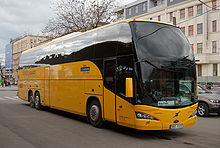České dráhy, often shortened to ČD, is the major railway operator in the Czech Republic providing regional and long-distance services.
Student Agency is a Czech travel agency whose main focuses are on au-pair programmes, resale of airline tickets, bus and rail transport. Its headquarters are in Brno, Czech Republic. Despite the company's name, their services are not sold exclusively to students. Student Agency is the sole owner of RegioJet, which operates bus and rail transport across the Czech Republic and Slovakia.
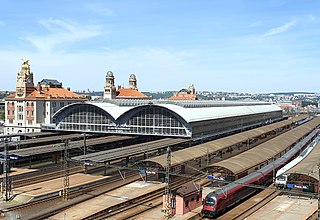
Praha hlavní nádraží is the largest railway station in Prague, Czech Republic. It opened in 1871 as Franz Josef Station, after Franz Joseph I of Austria. During the First Republic and from 1945 to 1948 the station was called Wilson Station, after the former President of the United States Woodrow Wilson.

The Class 471 electric motor unit, commonly known as CityElefant, is a double deck electric multiple unit operating on 3 kV DC overhead wires produced by Škoda Vagonka, a subsidiary of Škoda Transportation, since 1997 and operated by the České dráhy rail transit operator on its suburban services around Prague and Ostrava, Czech Republic. A single unit consists of a Class 471 power car with first class seating, a single Class 071 passenger car and a Class 971 cab car. They are replacement for defunct ČD Class 451, and successor to scrapped ČD Class 470.
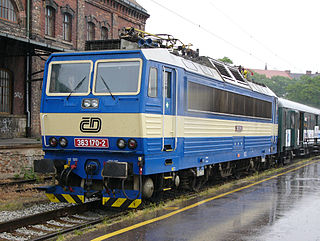
ČSD Class ES 499.1 is a class of electric locomotives used primarily for passenger trains in Czech Republic and Slovakia. Now classified as Class 363, these locomotives passed to České dráhy, rail operator in the Czech Republic, and to ZSSK, rail operator in Slovakia. Class 363 is also used by ČD Cargo and ZSSK Cargo for hauling freight trains.

ČD Class 680 are EMUs operating in the Czech Republic, using tilting Pendolino technology intended for the SuperCity train service. Built by Alstom, they were largely based on the nine-car ETR 470. While testing from Břeclav to Brno on November 18, 2004, the Pendolino reached a speed of 237 km/h (147 mph) and created a new Czech railway speed record. The units are able to operate on 25 kV 50 Hz AC, 15 kV 16.7 Hz AC and 3,000 V DC.

EuroNight, abbreviated EN, is a European train category that denotes many mainline national and international night train services within the Western and Central European inter-city rail network.

Railjet is a high-speed rail service in Europe operated by Austrian Federal Railways (ÖBB) and Czech Railways (ČD). Branded as Railjet Express (RJX) for the fastest services and as Railjet (RJ) for services with additional stops, it was introduced in 2008 and operates at speeds of up to 230 km/h (143 mph). Railjet is ÖBB's premier service and operates both domestically within Austria and on international services to adjacent major cities in the Czech Republic, Germany, Switzerland, Italy, Hungary and Slovakia.

Radim Jančura is a Czech businessman. He is the founder, sole owner and managing director of Student Agency and a board member of its subsidiary RegioJet.

Rail transport in the Czech Republic carried 193.5 million passengers in 2019, and 68.37 million tonnes of cargo in the year 2009. The majority of passenger services run nowadays are operated by the state company České dráhy, which until 2007 also managed cargo services now run by ČD Cargo. In 2009 the country had 9,420 km of standard gauge track, 3,153 km of which is electrified. There are two main electrification systems in the Czech Republic, 3 kV DC in the northern part, and 25 kV 50 Hz AC in the south. Locomotives had to be changed on boundaries in the past, two-system locomotives have been introduced in 1974. The network has same gauge links to all four countries bordering the Czech Republic with passenger services to all four countries in operation. Major hubs for international passenger services on the network are in Prague, Ostrava, Brno and Břeclav, and the busiest station is Praha hlavní nádraží. The maximum speed for passenger traffic is 160 km/h (100 mph).

Leo Express, formerly known as Rapid Express, is an open-access train operator in the Czech Republic, established in 2010. It launched inter-city services in November 2012 on the Prague–Ostrava route, on which state-owned operator Czech Railways and open-access operator RegioJet were already running trains.

Břeclav railway station is an important international railway junction in the Czech Republic, located in the town of Břeclav in South Moravia, close to the borders with Austria and Slovakia.

The Vindobona is an international named passenger train which began service in 1957 between Berlin and Vienna via Dresden and Prague. In later years the route was extended to run from Hamburg via Berlin, Dresden, Prague, Brno and Vienna to Villach. It was named after the ancient settlement of Vindobona on the site of the modern city of Vienna. Labelled as a EuroCity train connection from 1993, services discontinued in 2014.

High-speed rail in the Czech Republic is being planned with construction starting in 2026 and maximum speed between 200 and 320 km/h. Although České Dráhy owns and operates multiple rolling stock capable of speeds of 230 km/h (143 mph) since 2004, there is, as of 2023, no infrastructure capable of velocity over 200 km/h (124 mph). The only exception is the 13.3-kilometre long track at Velim railway test circuit with a maximum allowed speed of 230 km/h (143 mph) for tilting trains and up to 210 km/h (130 mph) for conventional trains. Czech rolling stock manufacturer Škoda Transportation has produced high-speed rolling stock since the 1970s.

Škoda 7Ev is an electric multiple unit produced by Škoda Transportation. The trainset was developed at the order of the České dráhy in 2011.

Škoda Transportation a.s. is a Czech engineering company that continues the legacy of Škoda Works' rolling stock manufacturing that started at the end of 19th century in Plzeň. Following the first world war, the Works commenced locomotive production in a separate factory dedicated to that purpose. This factory became a separate company in the 1990s. Today, Škoda Transportation develops and manufactures electric rail vehicles for urban and railway transport.
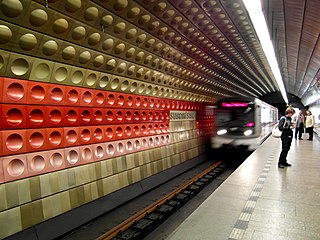
Prague Integrated Transport is an integrated public transport system providing services in Prague and within the Central Bohemian Region. It is run by a city-owned transit authority called Regional Organiser of Prague Integrated Transport (ROPID).

Siemens Viaggio Comfort is a brand of locomotive-hauled railroad passenger cars built by Siemens Mobility. The car was designed in the early 2000s and was based on the earlier Siemens Viaggio Classic railcars. The railcars were first used in 2008 on Railjet, a high-speed rail service in Europe operated by the Austrian Federal Railways (ÖBB) and Czech Railways (ČD).
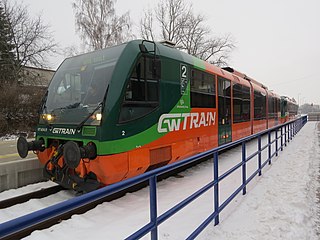
GW Train Regio is a Czech railway company mainly engaged in the operation of passenger rail transport on regional lines.

ComfortJet is a high-speed push-pull train which is being built by Siemens Mobility and Škoda Transportation for the Czech train operator České dráhy and it is planned to start operations from summer 2024. Based on the Railjet, Siemens developed its Vectrain train family. It will operate at speeds of up to 230 km/h and will replace old carriages on international EuroCity services between the Czech Republic, Germany, Denmark, Austria, Slovakia and Hungary and on domestic InterCity services in the Czech Republic.

